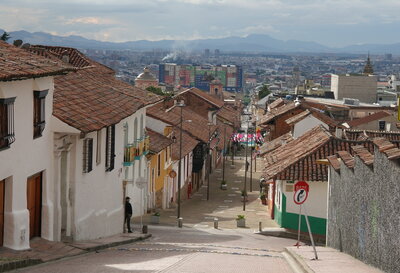By Ian Middleton
Ian Middleton (Ph.D. 2018, Musicology) is a UI grad and longtime friend of CLACS, having both TA'ed and taught LAST 170: Introduction to Latin American Studies. He now is an assistant professor of musicology at Universidad de los Andes in Colombia.
haz click aqui para leer en español

From our house, we can nearly see the official residence of the President. The steep streets of La Candelaria rise from the historic and political center of Bogotá towards the mountains that envelope the east of the capital. However, in the apartment where I live with my wife and young son, we don't share the point of view of President Iván Duque, but rather that of his most vociferous opponent in recent days, the new Mayor of Bogotá, Claudia López. As in many large cities, the dispute is over the relief of the restrictions we've lived under since March 20th in Bogotá. Duque wants construction and manufacturing workers to return straight away. Claudia proposes a more gradual, secure return of the workforce.
Colombia was quick to impose restrictions on movement when the pandemic struck, but Bogotá was even quicker. López asked citizens to carry out a quarantine simulation over a long weekend. This ran into the national measures, which have until now maintained the rates of infection and death relatively low. The restrictions are quite draconian. No going out for exercise, and López introduced a system whereby only women could go out for essential shopping on even dates, and only men on odd ones. Being the first woman and first openly gay person to occupy her position, this didn't come without controversy. Still, it has reduced numbers in the streets with minimal policing.
I must recognize that in my support from her I speak from a position of privilege. I have a university job I can do from home. We're among those who still receive their neat little organic grocery delivery and have no need to leave the house. It pains me to think of the millions of Colombias who live in acute poverty, informality, or even in jobs once considered decent, that have now ceased to exist. Bogotá feels like a pressure cooker. There's a great deal of basic need. There are already people taking to the streets of poorer neighborhoods. They protest the rise of utility bills, the lack of effective government support, the treatment of prisoners. Keeping the lid on will be tough. Nevertheless, the arguments of the Mayor seem to based on credible figures and statistics, rather than the desires of big business and established power structures for which Duque has always acted as a puppet. From the house, we watch and wait, hoping that rationality prevails.